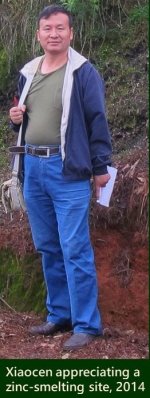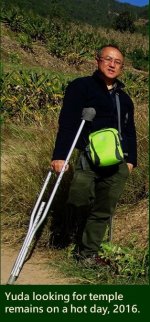The project and the team
This project is co-funded by the German Research Foundation (DFG) and the National Natural Science Foundation of China (NSFC) as a 3-year cooperation project by Nanny Kim and Dagmar Schäfer as the German, and Li Xiaocen 李晓岑 and his team as the Chinese partners.
Fieldwork is the core of our work in this project, while we depend on colleagues from a variety of fields for stimulating perspectives on piles of information sherds, preventing us from getting lost in detail or generalisations. This page introduces the team members by the amount of time that they can invest in this project.
In the order of invested time, we are:
She is a China historian who started out in representations and the delineation of identities, focussing on transport history and everyday technologies for a decade, and moving on to mining and historical geography for another. She profited from the 6-year DFG research group “Monies, Markets and Finance in China and East Asia, 1600-1900” organised by Hans Ulrich Vogel, to focus on transport while learning about mining and GIS. The network of collaboration partners in the group provided the exchange that allowed developing approaches to address questions that seemed intractable by traditional historical analysis as well the opportunity for a cooperation project with Yang Yuda on silver mines in the Far Southwest of late imperial China. With the help of a DFG project on “Environments, peoples and mining in the Far Southwest of China since 1500” from 2015 to 2018 (see http://www.zo.uni-heidelberg.de/sinologie/research/epm/) she has been able to carry out fieldwork and focussed research on mining and smelting technologies, thus laying the foundations for the present project.
L i Xiaocen 李晓岑 (Director of the Institute of the History of Technology, Nanjing University of Information, Science and Technology NUIST) is the leader of the Nanjing team. He has worked on metal objects and metallurgical technologies of southwestern China since 1988, focussing on material analysis as a tool for understanding metallurgical processes, on the identification of alloys, and the provenience of different metals. He has hitherto mainly worked on earlier periods, although contributing a first article on the importance of the late imperial period in 1997. He initiated the present project to devote his work on the under-researched field of late imperial mining and metallurgy.
i Xiaocen 李晓岑 (Director of the Institute of the History of Technology, Nanjing University of Information, Science and Technology NUIST) is the leader of the Nanjing team. He has worked on metal objects and metallurgical technologies of southwestern China since 1988, focussing on material analysis as a tool for understanding metallurgical processes, on the identification of alloys, and the provenience of different metals. He has hitherto mainly worked on earlier periods, although contributing a first article on the importance of the late imperial period in 1997. He initiated the present project to devote his work on the under-researched field of late imperial mining and metallurgy.
Li Xiaocen came to NUIST in 2015, where he founded the Institute for the History of Technology in March 2016. He has since assembled a team of young scholars with different specialisations in archaeo-metallurgy and related fields relevant to the history of mining and metallurgy. The participation of team members and students is essential for fieldwork as well as the analysis of specimens and the interpretatio n of findings.
n of findings.
Yang Yuda 杨煜达 is a climate historian as well as a specialist on the history of the Southwest. He initiated the fieldwork-based approach with the aim of assessing the scope of silver mining in the Far Southwest during the Ming and Qing. This led to a longstanding cooperation with Nanny Kim. On the initiative of Li Xiaocen, Yang Yuda is included with an associate project within the present project. This allows him to pursue fieldwork on silver mines. At the same time Yang Yuda’s research focus is now on new approaches to investigate markets and commodity flows that are based on specific sherds of evidence and systematic analyses of economic activities of state and non-state actors.
Dagmar Schäfer (director of the Department III, Artefacts, Action, Knowledge, Max Planck Institute for the History of Science MPIWG, Berlin) is the German partner of this project. She is a historian of technologies, knowledge and practice in China. She and her team provide methodological and comparative input from a wide range of research into artefacts, and practices that shaped societies and their scientific and technological histories.
Core members of the Nanjing team are Liu Peifeng 刘培峰, Yang Kai 杨凯, Liu Haifeng 刘海峰, Wu Youjin 吴又进 and Liu Jie 刘杰.
Liu Peifeng is a specialist in fieldwork-based archaeo-metallurgy and has worked extensively on the history of mining in Northwestern China, with a special focus on  crucible iron smelting. His strength lies in fieldwork and in the integration of disparate sherds of information into larger contexts.
crucible iron smelting. His strength lies in fieldwork and in the integration of disparate sherds of information into larger contexts.
Wu Youjin and Liu Jie are specialists in archaeo-metallurgical analyses. Liu Haifeng specialises in the archaeo-metallurgy of iron, and Yang Kai is a specialist in the comparative history of technology in Japan and China.
Students and student associates
Zhu Xiangying 朱香颖 is involved in fieldwork and writing an MA thesis using GIS for the spatial analysis of mines in central Yunnan.
Bu Chaoqun 卜超群 is involved in fieldwork and writing an MA thesis on copper technologies in central Yunnan.
Sun Hui 孙慧 is involved in editing and setting up the project homepage.
Collaboration partners
Christoph Bartels (Bergbaumuseum Bochum): comparative research on metallurgical and mining technologies
Cao Jin 曹晋 (Universität Tübingen): Georg Agricola in China
Enno Giele (Heidelberg University): Comparative perspectives on metals in early imperial China
Arturo Giraldez (University of the Pacific): Silver and global networks
Anke Hein (Oxford University): Archaeology in Southwest China
Rebecca O’Sullivan (Jilin University): Fieldwork and archaeo-metallurgy
Liu Siran 刘思然 (Beijing University of Science and Technology): silver metallurgy in Song and Ming China
Barbara Mittler (Heidelberg University): Cultures, mobilities and exchange
Christine Moll-Murata (Bochum University): History of labour and transmissions of technological knowledge
Enrst Pernicka (CEZ Archaeometry, Mannheim): Archaeo-metallurgy of silver mining
Song Baoquan 宋宝泉 (Bochum University): metallurgy and archaeology, comparative perspectives
Hans Ulrich Vogel (Tübingen University): mining and metallurgical knowledge and transmissions
Vu Duong Luan (Sun Yat-sen University, Guangzhou): mining in northern Vietnam and borderland societies
Jeanette Werning (Heidelberg University): Archaeological studies on tools and implements in China
Zhou Qiong 周琼 (Yunnan University): Societies and environments in Southwestern China

